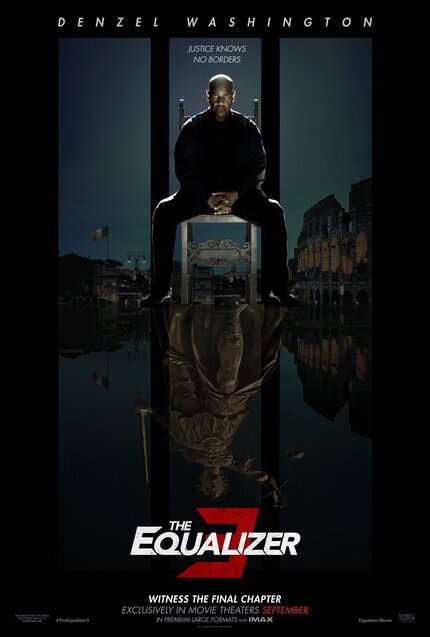THE EQUALIZER 3 Review: Denzel Washington Elevates Uneven, Middling Entry

Moments into the inelegantly titled The Equalizer 3, the trilogy capper that reunites director Antoine Fuqua (Emancipation, The Magnificent Seven, Training Day), and screenwriter Richard Wenk (The Equalizer and The Equalizer 2), with two-time Oscar winner Denzel Washington, two men -- one obviously frightened by what he's seen and heard, another maddened by the intrusion on his private property -- take an unplanned tour of an Italian winery decorated with the dismembered bodies and spilled blood of the latter’s henchmen, before encountering Washington’s title character, Robert McCall, an ex-DIA-agent-assassin-turned-vigilante-hero, sitting quietly in a backroom, guns pointed at his head.
As the fastidious, stoic McCall carefully folds a wine or blood-covered napkin in half, the scene unfolds in predictable, predictably satisfying fashion. MacCall speaks, softly and unemotionally, offering the older man a simple, stark choice: give him what he wants and live; don’t, and die violently, painfully.
Never in doubt, the choice leads to McCall’s tightly wound, still form springing into deadly, brutal action, leaving every other man in the room dead. Despite his “ruthless, efficient killing machine”/unstoppable slasher status, though, McCall doesn’t escape unscathed. A moment of weakness, a back turned at the wrong time, almost leads to his demise.
As with the previous two entries in the series, what’s past is prologue and vice versa McCall might be seriously wounded and possibly near-death, but a near-miraculous intervention on the side of a road not only saves his life, but comes close to saving his soul from self-imposed damnation.
A shockingly helpful carabinieri, Gio Bonucci (Eugenio Mastrandrea), intervenes first, an empathetic local doctor, Enzo Arisio (Remo Girone), second, leaving McCall initially worse for wear, but healing in mind, spirit, and body over the course of The Equalizer 3’s nearly action-free running time. It’s almost too good to be true — and in the real world, certainly would be — but here, it provides McCall a welcome break, a chance to ruminate and meditate on his life choices and whatever time he has left.
Where McCall goes, of course, trouble is never far behind. This time out, the Sicilian Mafia threatens the sanctuary McCall has constructed for himself in the small, seaside town of Altamonte on the Amalfi Coast.
With its winding, cobblestone streets, vertical structures built on the side of a mountain, and the ever-present hum of Roman Catholicism in the background (obtrusive for some in the audience certainly, though not for McCall), Altamonte seems to have been time-dropped from the late 19th- or early 20th-century (modern firearms, cars, and motorcycles excepted).
McCall also develops a mildly flirtatious relationship with a local cafe owner, Aminah (Gaia Scodellaro), before encountering a newly field-promoted CIA agent, Emma Collins (Dakota Fanning), eyeing him from across the table. Apparently, someone’s tipped off the CIA to a potentially dangerous development connecting the Middle East and Italy. Collins wants to find out the who, what, when, and where before innocent civilians are involved. It’s all that McCall, as world-weary as he’s ever been, can do not to utter, “Every time I think I’m out, they pull me back in.”
And that they do. After three entries of variable quality and fluctuating body counts, the Equalizer series has settled into comfortable familiarity with Washington holding the center with a mix of irony-free gravitas and movie-star charisma. The plots themselves matter little — or less and less from entry to entry — with McCall taking down an Eastern European human trafficking ring in the first film, his old agency colleagues-turned-mercenaries in the second, and now, in the cliche to end all cliches (at least where Italy is concerned), the Sicilian Mafia, here depicted as a random assortment of tattooed thugs, slick Italian suits, and an overabundance of well-tended facial hair.
They don’t stand a chance, of course, against vengeance personified, but The Equalizer 3 takes its time, maybe too much time, getting to the meat-and-potatoes of the series, McCall, as ruthless and pitiless as ever, massacring the film’s designated villains, from the near-faceless henchmen on up through McCall’s central antagonist, a murderous sociopath who gets exactly what he deserves (i.e., a cathartic burst of violence). Their individual and collective demise is made all the more satisfying by showing them at their worst early on, abusing or physically assaulting various townspeople, often humiliating them in front of their peers or family.
Action-wise, Fuqua and Wenk make the curious decision to keep McCall chilling in the background. After the prolific bloodletting of the prologue, it settles into a rest-and-recuperation drama as McCall heals from his injuries and slowly warms up to making Altamonte his permanent home.
More than hour passes before McCall re-engages his assassin side, unleashing a final half hour filled with exactly what audiences have paid to see and hear: Washington the movie/action star doing what few others have, can, or will do, cutting a vengeance-filled swath through seemingly innumerable henchmen and their leaders, cleansing the world of violence through violence. That might sound like a contradiction in terms, but it’s one audiences have and will continue to embrace.
The Equalizer 3 opens today (Friday, Septeber 1, 2023), only in movie theaters, via Columbia Pictures throughout North America.
The Equalizer 3
Director(s)
- Antoine Fuqua
Writer(s)
- Richard Wenk
- Michael Sloan
- Richard Lindheim
Cast
- Denzel Washington
- Dakota Fanning
- Eugenio Mastrandrea







